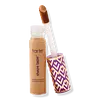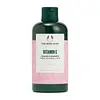What's inside
What's inside
 Key Ingredients
Key Ingredients

 Benefits
Benefits

 Concerns
Concerns

 Ingredients Side-by-side
Ingredients Side-by-side

Water
Skin ConditioningCyclopentasiloxane
EmollientCyclohexasiloxane
EmollientMethyl Methacrylate Crosspolymer
Butylene Glycol
HumectantPEG-10 Dimethicone
Skin ConditioningTrimethylsiloxysilicate
EmollientSodium Chloride
MaskingDisteardimonium Hectorite
StabilisingCetyl PEG/PPG-10/1 Dimethicone
EmulsifyingAluminum Hydroxide
EmollientAmyl Cinnamal
PerfumingBenzyl Salicylate
PerfumingConvallaria Majalis Bulb/Root Extract
Skin ConditioningDimethicone/Vinyl Dimethicone Crosspolymer
Skin ConditioningDisodium EDTA
Ethylhexylglycerin
Skin ConditioningGeraniol
PerfumingGlycyrrhiza Glabra Root Extract
BleachingHelianthus Annuus Seed Oil
EmollientHexyl Cinnamal
PerfumingHydroxycitronellal
PerfumingLeontopodium Alpinum Flower/Leaf Extract
Skin ConditioningLilium Candidum Flower Extract
Skin ConditioningLimonene
PerfumingLinalool
PerfumingMagnolia Liliflora Flower Extract
Skin ConditioningMangifera Indica Seed Butter
Skin ConditioningOlea Europaea Fruit Oil
MaskingPaeonia Lactiflora Root Extract
Skin ConditioningParfum
MaskingPhenoxyethanol
PreservativeTocopherol
AntioxidantTriethoxycaprylylsilane
Triethyl Citrate
MaskingButyrospermum Parkii Butter
Skin ConditioningUlmus Davidiana Root Extract
Skin ConditioningGlycerin
HumectantPentaerythrityl Tetra-Di-T-Butyl Hydroxyhydrocinnamate
AntioxidantTbhq
AntioxidantTitanium Dioxide
Cosmetic ColorantIron Oxides
Water, Cyclopentasiloxane, Cyclohexasiloxane, Methyl Methacrylate Crosspolymer, Butylene Glycol, PEG-10 Dimethicone, Trimethylsiloxysilicate, Sodium Chloride, Disteardimonium Hectorite, Cetyl PEG/PPG-10/1 Dimethicone, Aluminum Hydroxide, Amyl Cinnamal, Benzyl Salicylate, Convallaria Majalis Bulb/Root Extract, Dimethicone/Vinyl Dimethicone Crosspolymer, Disodium EDTA, Ethylhexylglycerin, Geraniol, Glycyrrhiza Glabra Root Extract, Helianthus Annuus Seed Oil, Hexyl Cinnamal, Hydroxycitronellal, Leontopodium Alpinum Flower/Leaf Extract, Lilium Candidum Flower Extract, Limonene, Linalool, Magnolia Liliflora Flower Extract, Mangifera Indica Seed Butter, Olea Europaea Fruit Oil, Paeonia Lactiflora Root Extract, Parfum, Phenoxyethanol, Tocopherol, Triethoxycaprylylsilane, Triethyl Citrate, Butyrospermum Parkii Butter, Ulmus Davidiana Root Extract, Glycerin, Pentaerythrityl Tetra-Di-T-Butyl Hydroxyhydrocinnamate, Tbhq, Titanium Dioxide, Iron Oxides
Water
Skin ConditioningEthylhexyl Palmitate
EmollientIsohexadecane
EmollientSorbitol
HumectantDimethicone
EmollientSorbitan Stearate
EmulsifyingGlycine Soja Oil
EmollientTriticum Vulgare Germ Oil
EmollientPhenoxyethanol
PreservativeGlyceryl Stearate
EmollientPEG-100 Stearate
Cetearyl Alcohol
EmollientTocopherol
AntioxidantButyrospermum Parkii Butter
Skin ConditioningAcrylates/C10-30 Alkyl Acrylate Crosspolymer
Emulsion StabilisingParfum
MaskingEthylhexylglycerin
Skin ConditioningRubus Idaeus Seed Oil
EmollientSodium Hydroxide
BufferingDisodium EDTA
Benzyl Benzoate
AntimicrobialBenzyl Alcohol
PerfumingGeraniol
PerfumingLinalool
PerfumingLimonene
PerfumingHydroxycitronellal
PerfumingAlpha-Isomethyl Ionone
PerfumingCitric Acid
BufferingWater, Ethylhexyl Palmitate, Isohexadecane, Sorbitol, Dimethicone, Sorbitan Stearate, Glycine Soja Oil, Triticum Vulgare Germ Oil, Phenoxyethanol, Glyceryl Stearate, PEG-100 Stearate, Cetearyl Alcohol, Tocopherol, Butyrospermum Parkii Butter, Acrylates/C10-30 Alkyl Acrylate Crosspolymer, Parfum, Ethylhexylglycerin, Rubus Idaeus Seed Oil, Sodium Hydroxide, Disodium EDTA, Benzyl Benzoate, Benzyl Alcohol, Geraniol, Linalool, Limonene, Hydroxycitronellal, Alpha-Isomethyl Ionone, Citric Acid
 Reviews
Reviews

Ingredients Explained
These ingredients are found in both products.
Ingredients higher up in an ingredient list are typically present in a larger amount.
This ingredient is also known as shea butter. It is an effective skin hydrator and emollient.
Emollients help soothe and soften your skin. It does this by creating a protective film on your skin. This barrier helps trap moisture and keeps your skin hydrated. Emollients may be effective at treating dry or itchy skin.
Shea butter is rich in antioxidants. Antioxidants help fight free-radicals, or molecules that may harm the body. It is also full of fatty acids including stearic acid and linoleic acid. These acids help replenish the skin and keep skin moisturized.
While Shea Butter has an SPF rating of about 3-4, it is not a sunscreen replacement.
Shea butter may not be fungal acne safe. We recommend speaking with a professional if you have any concerns.
Learn more about Butyrospermum Parkii ButterDisodium EDTA plays a role in making products more stable by aiding other preservatives.
It is a chelating agent, meaning it neutralizes metal ions that may be found in a product.
Disodium EDTA is a salt of edetic acid and is found to be safe in cosmetic ingredients.
Learn more about Disodium EDTAEthylhexylglycerin (we can't pronounce this either) is commonly used as a preservative and skin softener. It is derived from glyceryl.
You might see Ethylhexylglycerin often paired with other preservatives such as phenoxyethanol. Ethylhexylglycerin has been found to increase the effectiveness of these other preservatives.
Geraniol is used to add fragrance/parfum to a product. It is the main component of citronellol. It is a monoterpenoid and an alcohol.
Monoterpenes are naturally found in many parts of different plants.
Geraniol can be found in many essential oils including Rose Oil and Citronella Oil. The scent of Geraniol is often described as "rose-like". Many foods also contain Geraniol for fruit flavoring.
Geraniol can irritate the skin when exposed to air. However, irritation depends on the ability of geraniol to penetrate into the skin. In general, geraniol is not able to penetrate skin easily.
Geraniol is colorless and has low water-solubility. However, it is soluble in common organic solvents.
Like citronellol, it is a natural insect repellent.
2,6-Octadien-1-ol, 3,7-dimethyl-, (2E)-
Learn more about GeraniolHydroxycitronellal is a fragrance created from citronellal. The smell of hydroxycitronellal is often described as "citrus-like" or "melon-like".
Hydroxycitronellal is a known EU allergen and may cause irritation when applied to the skin.
Limonene is a fragrance that adds scent and taste to a formulation.
It's found in the peel oil of citrus fruits and other plants such as lavender and eucalyptus. The scent of limonene is generally described as "sweet citrus".
Limonene acts as an antioxidant, meaning it helps neutralize free radicals.
When exposed to air, oxidized limonene may sensitize the skin. Because of this, limonene is often avoided by people with sensitive skin.
The term 'fragrance' is not regulated in many countries. In many cases, it is up to the brand to define this term. For instance, many brands choose to label themselves as "fragrance-free" because they are not using synthetic fragrances. However, their products may still contain ingredients such as essential oils that are considered a fragrance.
Learn more about LimoneneLinalool is a fragrance and helps add scent to products. It's derived from common plants such as cinnamon, mint, citrus, and lavender.
Like Limonene, this ingredient oxidizes when exposed to air. Oxidized linalool can cause allergies and skin sensitivity.
This ingredient has a scent that is floral, spicy tropical, and citrus-like.
Learn more about LinaloolParfum is a catch-all term for an ingredient or more that is used to give a scent to products.
Also called "fragrance", this ingredient can be a blend of hundreds of chemicals or plant oils. This means every product with "fragrance" or "parfum" in the ingredients list is a different mixture.
For instance, Habanolide is a proprietary trade name for a specific aroma chemical. When used as a fragrance ingredient in cosmetics, most aroma chemicals fall under the broad labeling category of “FRAGRANCE” or “PARFUM” according to EU and US regulations.
The term 'parfum' or 'fragrance' is not regulated in many countries. In many cases, it is up to the brand to define this term.
For instance, many brands choose to label themselves as "fragrance-free" because they are not using synthetic fragrances. However, their products may still contain ingredients such as essential oils that are considered a fragrance by INCI standards.
One example is Calendula flower extract. Calendula is an essential oil that still imparts a scent or 'fragrance'.
Depending on the blend, the ingredients in the mixture can cause allergies and sensitivities on the skin. Some ingredients that are known EU allergens include linalool and citronellol.
Parfum can also be used to mask or cover an unpleasant scent.
The bottom line is: not all fragrances/parfum/ingredients are created equally. If you are worried about fragrances, we recommend taking a closer look at an ingredient. And of course, we always recommend speaking with a professional.
Learn more about ParfumPhenoxyethanol is a preservative that has germicide, antimicrobial, and aromatic properties. Studies show that phenoxyethanol can prevent microbial growth. By itself, it has a scent that is similar to that of a rose.
It's often used in formulations along with Caprylyl Glycol to preserve the shelf life of products.
Tocopherol (also known as Vitamin E) is a common antioxidant used to help protect the skin from free-radicals and strengthen the skin barrier. It's also fat soluble - this means our skin is great at absorbing it.
Vitamin E also helps keep your natural skin lipids healthy. Your lipid skin barrier naturally consists of lipids, ceramides, and fatty acids. Vitamin E offers extra protection for your skin’s lipid barrier, keeping your skin healthy and nourished.
Another benefit is a bit of UV protection. Vitamin E helps reduce the damage caused by UVB rays. (It should not replace your sunscreen). Combining it with Vitamin C can decrease sunburned cells and hyperpigmentation after UV exposure.
You might have noticed Vitamin E + C often paired together. This is because it is great at stabilizing Vitamin C. Using the two together helps increase the effectiveness of both ingredients.
There are often claims that Vitamin E can reduce/prevent scarring, but these claims haven't been confirmed by scientific research.
Learn more about TocopherolWater. It's the most common cosmetic ingredient of all. You'll usually see it at the top of ingredient lists, meaning that it makes up the largest part of the product.
So why is it so popular? Water most often acts as a solvent - this means that it helps dissolve other ingredients into the formulation.
You'll also recognize water as that liquid we all need to stay alive. If you see this, drink a glass of water. Stay hydrated!
Learn more about Water